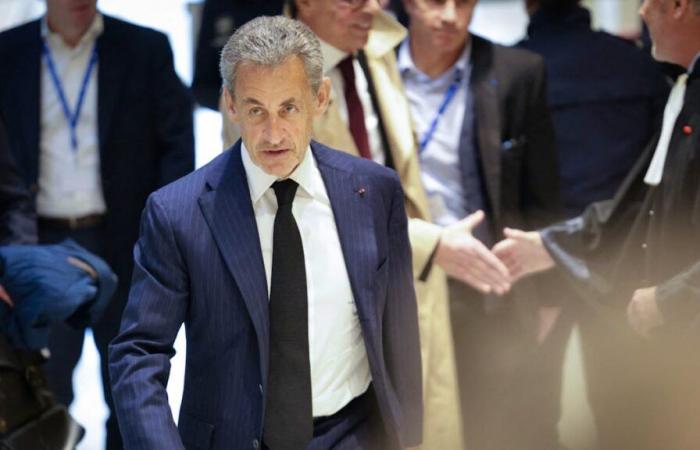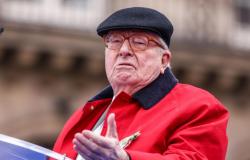Nicolas Sarkozy was delighted to be able to speak this Monday.
AFP
Foreign money to finance his 2007 campaign? “I didn’t need it”: “the meetings were overflowing”, “the supporters were rushing in”, Nicolas Sarkozy firmly dismissed Monday at his trial for corruption in Paris, describing the “exceptional” enthusiasm that his candidacy had aroused in the presidential election.
Sitting in his chair since the start of the hearing which saw the hearing of a witness called by his lawyers, the former president is only too happy to speak when the president invites him to the stand in the middle of afternoon.
Nicolas Sarkozy has been on trial since January 6 and until April 10, alongside eleven other defendants, for suspicion of financing his 2007 presidential campaign by the Libyan dictator Muammar Gaddafi, in exchange for quid pro quo.
On the first day of the interrogations, Nathalie Gavarino returns to the political career of the former tenant of the Élysée who said she began, upon his election to the town hall of Neuilly in 1983, to build a “presidential stature”. “I wanted to do politics at the highest level, I imagined I could build a destiny for myself and I devoted my life to it until exactly 2016,” declares the former president, 69, in a suit and tie black.
“Very early on, observers found that I was a little different from the others and attributed to me ambitions that I myself dreamed of. From my adolescence, it was a dream, a desire, and afterward, life disposes,” he continues with relish.
“I don’t lack your energy”
With grand gestures, he willingly agrees to confirm the major stages of his CV, evoking in a response his “energy when he was young” – “you don’t lack it,” the president interrupts. “So, imagine at 21!” he replies.
Electron as deputy in 1988, entry into government in 1993, episode of the Neuilly hostage-taking which made him known at the “national” level, break with his mentor Jacques Chirac for the unfortunate campaign of Edouard Balladur… the president traces the thread of his rise, until his entry into government in 2002, his election at the head of the UMP two years later against a backdrop of war with the Chiraquians, and finally his inauguration for the presidential election in 2007.
“When did you think about financing?” asks Nathalie Gavarino. “Never, because it’s never been a problem. From the moment I became president of the UMP, the party continued to garner thousands of supporters, there were 335,000 members. I had the wind in my sails, the support was rushing in, the activists, it was at a level that no one has ever achieved, the meetings were overflowing with people,” says the accused, specifying that he had even installed himself at the headquarters of the “first party of France” a “machine” which displayed new memberships “in real time”.
At most he went to “fundraising lunches or dinners” organized by “the whole team around Eric Woerth”. “I have never chosen a service provider for my campaign nor met a service provider for my campaign,” he adds, wanting to distinguish himself from the outset from the treasurer of his campaign, who was also informed, but absent on Monday.
“I was not at the head of a sect or a clan, but of a vast popular movement, my majority went from Philippe de Villiers to Bernard Kouchner, it’s immense!”, insists -he.
An ice cream with Brice Hortefeux
“So, you are not tempted to go and ask a foreign head of state for money at the end of 2006?”, asks the magistrate.
“No. A: I had no idea, I’m not crazy. Two: I didn’t need it. Three: there are lots of heads of state that I knew, because I was an Interior Minister who never stopped traveling,” he continues.
The questions then move on to his relationships with two other co-defendants seated behind him: Claude Guéant, his “closest collaborator”, and Brice Hortefeux, a “great friend” met during a meeting where the future president had spoken then that they were barely 20 years old.
“He said to me “I want to be with you”, I arranged to meet him in a drugstore three days later to have an ice cream, and we became friends,” adds Nicolas Sarkozy.
(afp)






